Rev. Clay Evans and Father George Clements: The incredible legacies of two spiritual giants
By The Final Call | Last updated: Dec 4, 2019 - 11:06:56 AMWhat's your opinion on this article?
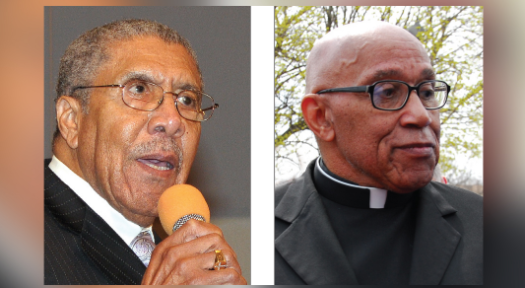
L) Rev. Clay Evans (R) Father George Clements
|
CHICAGO— The world of religion, the country and Black Chicago recently lost two spiritual and civil rights stalwarts. Longtime pastor of Friendship Missionary Baptist Church and gospel musician extraordinaire the Rev. Clay Evans, and Roman Catholic Church pioneering priest Father George Clements.
Both men left indelible marks and lasting legacies through their unapologetic work in uplifting Black people, often going against status quo political and religious leadership and institutions who felt clergy should be relegated to certain “acceptable” and nonthreatening boundaries.
“These are men who were real leaders,” said Hermene Hartman, longtime media publisher and founder of N’Digo magazine. She shared her reflections on Rev. Evans and Father Clements.
“They talk about leadership now like it’s in a can or a package. These were real leaders who led their community, who worked for their people, who stood up to politicians to say ‘no.’ These guys were revolutionary really,” Ms. Hartman told The Final Call after a Nov. 27 press conference at Friendship Missionary Baptist Church convened by Rev. Jesse Jackson and other clergy after news of Rev. Evans death broke earlier in the day. He was 94 years old. Father Clements died just two days earlier on Nov. 25 at age 87.
Rev. Evans is scheduled to lie in repose from noon to 7 p.m. Dec. 6 at Fellowship Missionary Baptist Church, 4543 South Princeton Ave., followed by a governmental and civic celebration of his life at 7 p.m. Final visitation and the official celebration of life will take place Dec. 7 starting at 8 a.m. at Apostolic Faith Church, 3823 S. Indiana Ave. Local media reports Father Clements’ body will be donated to science and that a memorial service will be held at St. Sabina Church on Jan. 26.
“Both Father Clements and Brother Clay Evans were two men, when I first came to Chicago with Rev. Dr. Martin Luther King., Jr. and lived with him on the West Side of Chicago and we give birth to the movement in Chicago, these men took parts of the movement that he had preached about and organized about and opened up the Black church as an opportunity for liberation for Chicago,” said Rev. Al Sampson of Fernwood United Methodist Church.
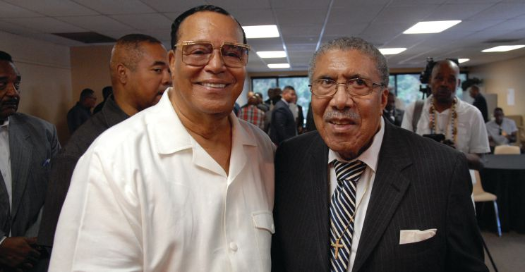
The Honorable Minister Louis Farrakhan and Rev. Clay Evans.
|
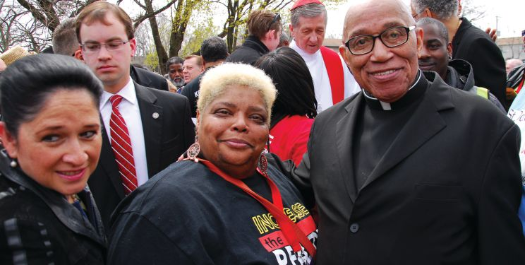
Father George Clements was an advocate for strong communities. Here he is in 2017 at a Chicago Peace March in Englewood.
|
Father Clements and Rev. Evans were both supporters of Dr. Martin Luther King Jr. during the height of the civil rights movement when it was not popular to align with the Georgia preacher. Rev. Evans opened his church doors to Dr. King when many pastors refused, and he was punished for it. By defying the orders of then-Mayor Richard J. Daley by welcoming Dr. King, the city made it difficult for Rev. Evans to obtain permits to complete construction on his church.
“This church stood for seven years in a steel shell because Mayor Daley stopped his loan permits and so forth for the construction of the church and that was because he allowed Dr. King to speak from his pulpit and Daley did not want King here. There were six aldermen who did not want him here and that (Rev. Evans’) fortitude and vision is phenomenal,” said Ms. Hartman who first met Rev. Evans when she was a 17-year-old volunteer at Operation Breadbasket, now Operation Push. It was his steadfastness, integrity and fearlessness that she admired.
Rev. Evans helped launch Operation Breadbasket and Operation PUSH, then known as Rainbow PUSH with Rev. Jesse Jackson.
“Rev. Clay Evans laid the groundwork for our advancements as a people in Chicago and around the nation,” said Rev. Jackson in a statement.
Rev. Evans wrote and sang several gospel hits and made it onto the Billboard charts as a gospel music artist several times.
“Gospel wasn’t his career, gospel was a part of what he was doing,” said former Chicago Alderman Dorothy Tillman. “Dr. King said a preacher has to know a good song and a Bible,” she continued. “There are some people when they leave, nobody cares about them leaving but their immediate family and the people around them and don’t have an impact in the Black community but he’s one of those trees in the forest that have fallen that have a great impact with his wisdom. He gave a lot,” said Ms. Tillman.
Not only did Rev. Evans break ground over the airways, he ushered in the concept of the mega church. Exposure from his radio and television program propelled Fellowship into that status, observed Rev. James T. Meeks, pastor of Salem Baptist Church on Chicago’s South Side. But it was Rev. Evans’ preaching, what Rev. Meeks called “a pure unadulterated Christian message,” that brought people back.
“He was preaching what the Bible said without compromise,” Rev. Meeks said. “Some pastors will preach what is comfortable and what people want to hear. They just want to preach what the scripture says and stand on it alone. So, if people don’t like it, they will change up their message. Rev. Evans was not going to change up his message for anybody.”
“His preaching wasn’t just about the afterlife. He had a dual eschatology,” added Rev. Ira Acree, who’s celebrating 30 years as pastor of Greater St. John’s Bible Church on Chicago’s West Side. “He didn’t just believe in heaven, but he preached the gospel in a way that a part of heaven comes to earth.”
Rev. Marshall E. Hatch, pastor of New Mount Pilgrim Missionary Baptist Church on Chicago’s West Side, called Rev. Evans a great leader who could sing and preach, but also understood and knew how to move and organize people. His loss, he said, will be felt immensely.
Former Chicago Mayor Rahm Emanuel expressed his condolences via Twitter, calling Rev. Evans a religious and spiritual leader “who called for the best in humanity.” “When he spoke, his voice was heard in Chicago & echoed across America, & we are a better city & nation for it,” Mr. Emanuel tweeted.
“Over the course of his incredible, five-decade career leading the Fellowship Missionary Baptist Church, Rev. Evans tirelessly sought to uplift the lives of his parishioners and fellow residents through service and support,” said current Chicago Mayor Lori Lightfoot in a statement.
Rev. Evans not only stood for civil and human rights, but he also stood for women’s rights, said Rev. Janette Wilson of Rainbow PUSH where she serves as national director of PUSH Excel. In 1954 Rev. Evans ordained Consuela York, known as “Mother York,” the first Black woman to be ordained into the Baptist clergy in the city of Chicago. It was an unprecedented and bold move for a woman to not only speak from a church pulpit but to preside over a church. Rev. Wilson was the second Black woman ordained by Rev. Evans.
“He was the first Baptist preacher to ordain a woman in this state and he suffered mightily with the denomination, the National Baptists, as the result of ordaining Mother Consuela York. I was the second woman he ordained 40 years later,” said Rev. Wilson.
“The fact that he would stand firm on his faith and his belief, he just would not bow. He didn’t bow when he brought in Dr. King, he didn’t bow when he ordained Mother York. He believed in justice and fairness for everyone. He’s one of a few giants in ministry and civil rights that was revered by everyone,” she said. Rev. Wilson said Rev. Evans was also ecumenical in his friendships which included clergy from the Jewish community, other Christian denominations and Nation of Islam Minister Louis Farrakhan.
Bishop James Stevenson, pastor of Sweet Relief Baptist Church on the city’s West Side said Rev. Evans was a mentor and father-figure to so many. Bishop Stevenson said he will hold on to the counsel he received from Rev. Evans, particularly wise guidance he received from him during a difficult time in his life. Many pastors recalled the generosity Rev. Evans had in inviting young, gifted and up and coming pastors to speak at his pulpit.
Among those young pastors was Rev. Charles Jenkins, who succeeded Rev. Evans as pastor of Fellowship in 2000. He described Rev. Evans as an “icon” and “a servant of God personified.”
“He loved Minister Farrakhan, considered him a son and the entire family and community of the Nation he revered, respected and loved greatly,” said Rev. Jenkins, who will be stepping down as pastor of Fellowship later this month. He turned 25 the week after delivering his first sermon as pastor after being installed by Rev. Evans.
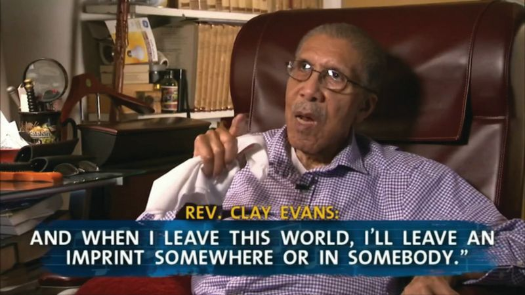
|
The fact that Rev. Evans had no hesitation in having someone so young lead the church speaks to his visionary ability to see what or who others cannot see, explained Rev. Jenkins. “He saw potential where maybe I didn’t see it. He saw a possibility and maybe I didn’t see it but that was the kind of leader he was,” he added.
“He was not a late bloomer when it came to serving people or developing people or giving people opportunities. He was actually on the front end, trailblazer, trendsetter, a lane maker, door opener. So as young as I was, he named me his successor when I was 21. But not just me. He believed in so many young men and young women.”
In 1945 Father Clements became the first Black graduate of Archbishop Quigley Preparatory Seminary. He was ordained as a priest in 1957. In 1969, Father Clements became the first Black pastor of Holy Angels Catholic Church on Chicago’s South Side. He marched with Dr. Martin Luther King Jr. and stood up for justice on behalf of the Black Panther Party when Chicago police and law enforcement shot and killed Mark Clark and Fred Hampton during a predawn raid in 1969.
In reflecting on the legacy of Father Clements, Ms. Hartman said, “I guess what you remember most, State’s Attorney (Edward) Hanrahan was shooting Panthers, he was killing them. Bobby got away. You know where he went? He went to Father Clements church. He was in the church. He saved his life. It was the right thing to do.” The Bobby she was speaking about was Black Panther Bobby Rush, who is now a member of the U.S. Congress.
“Reverend Clay Evans was a prophet, a priest, and a pastor to both parishioners and pastors,” Congressman Rush (D-Ill.) whose district encompasses parts of Chicago, said via Twitter. “His death—in the same week as that of Father George Clements, who was also an inspirational icon and tireless servant—has left us all with yet another unimaginable loss.”
Father Clements started programs to help those struggling with drug addiction and those who had been incarcerated. In 1980 he created the One Church One Child program to help Catholic churches find adoptive parents for orphaned Black children. Defying the Catholic Archdiocese, Father Clements became the first American priest to adopt a child and later adopted three more. It was a moved frowned upon by the Catholic Church but it later relented stating adopting a child would not interfere with the priest’s pastoral duties.
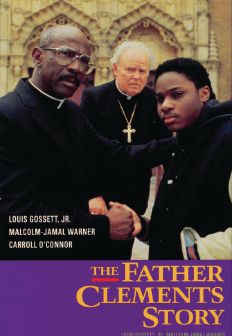
|
His story and work career inspired the 1987 made-for-TV movie “The Father Clements Story,” starring Lou Gossett Jr. and Malcolm-Jamal Warner.
“Saddened by the news that Chicago icon Father George Clements has passed away. I had been an alter boy for him at St Dorothy’s. He impacted countless lives and careers and I’ll never forget him speaking at my mother’s funeral. He shall be missed. RIP,” wrote actor and director from the South Side of Chicago Rondell Sheridan on Twitter.
“#GeorgeClements was the pastor of my childhood church. I have many wonderful memories from that period of my life, including the excitement we felt during the filming of ‘The Father Clements Story’,” said Chicago-based journalist Aisha I. Jefferson.
Father Michel Pfleger, pastor of St. Sabina, was a friend of Father Clements and was trained by him. “I thank God for the life of Fr. George Clements, a Pioneer for Justice who spent his life helping people,” he posted in a statement on Facebook. “He pushed the Catholic church to be inclusive and made Black Catholics proud to be Catholic. Rest in Power my friend.”
—Starla Muhammad, Tariqah Shakir-Muhammad, Toure Muhammad and LaRisa Lynch
INSIDE STORIES AND REVIEWS
-
-
About Harriett ... and the Negro Hollywood Road Show
By Rabiah Muhammad, Guest Columnist » Full Story -
Skepticism greets Jay-Z, NFL talk of inspiring change
By Bryan 18X Crawford and Richard B. Muhammad The Final Call Newspaper @TheFinalCall » Full Story -
The painful problem of Black girls and suicide
By Charlene Muhammad -National Correspondent- » Full Story -
Exploitation of Innocence - Report: Perceptions, policies hurting Black girls
By Charlene Muhammad -National Correspondent- » Full Story -
Big Ballin: Big ideas fuel a father’s Big Baller Brand and brash business sense
By Bryan Crawford -Contributing Writer- » Full Story






 Click Here Stay Connected!
Click Here Stay Connected!








